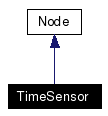 6.69 TimeSensor
6.69 TimeSensor
TimeSensor nodes generate events as time passes. TimeSensor nodes can
be used for many purposes including:
- driving continuous simulations and animations;
- controlling periodic activities (e.g., one per minute);
- initiating single occurrence events such as an alarm clock.
The TimeSensor node contains two discrete eventOuts: isActive
and cycleTime. The isActive eventOut sends TRUE when the TimeSensor
node begins running, and FALSE when it stops running. The cycleTime
eventOut sends a time event at startTime and at the beginning of
each new cycle (useful for synchronization with other time-based objects).
The remaining eventOuts generate continuous events. The fraction_changed
eventOut, an SFFloat in the closed interval [0,1], sends the completed fraction
of the current cycle. The time eventOut sends the absolute time for
a given simulation tick.
If the enabled exposedField is TRUE, the TimeSensor node is enabled
and may be running. If a set_enabled FALSE event is received while
the TimeSensor node is running, the sensor performs the following actions:
- evaluates and sends all relevant outputs;
- sends a FALSE value for isActive;
- disables itself.
Events on the exposedFields of the TimeSensor node (e.g., set_startTime)
are processed and their corresponding eventOuts (e.g., startTime_changed)
are sent regardless of the state of the enabled field. The remaining
discussion assumes enabled is TRUE.
The loop, startTime, and stopTime exposedFields and the
isActive eventOut and their effects on the TimeSensor node are discussed
in detail in 4.6.9, Time-dependent nodes.
The "cycle" of a TimeSensor node lasts for cycleInterval
seconds. The value of cycleInterval shall be greater than zero.
A cycleTime eventOut can be used for synchronization purposes
such as sound with animation. The value of a cycleTime eventOut will
be equal to the time at the beginning of the current cycle. A cycleTime
eventOut is generated at the beginning of every cycle, including the
cycle starting at startTime. The first cycleTime eventOut
for a TimeSensor node can be used as an alarm (single pulse at a specified
time).
When a TimeSensor node becomes active, it generates an isActive =
TRUE event and begins generating time, fraction_changed,
and cycleTime events which may be routed to other nodes to drive
animation or simulated behaviours. The behaviour at read time is described
below. The time event sends the absolute time for a given tick of
the TimeSensor node (time fields and
events represent the number of seconds since midnight GMT January 1,
1970).
fraction_changed events output a floating point value in the closed
interval [0, 1]. At startTime the value of fraction_changed
is 0. After startTime, the value of fraction_changed in any
cycle will progress through the range (0.0, 1.0]. At startTime + N × cycleInterval,
for N = 1, 2, ..., that is, at the end of every cycle, the value of
fraction_changed is 1.
Let now represent the time at the current simulation tick. Then
the time and fraction_changed eventOuts can then be
computed as:
time = now
temp = (now - startTime) / cycleInterval
f = fractionalPart(temp)
if (f == 0.0 && now > startTime) fraction_changed = 1.0
else fraction_changed = f
where fractionalPart(x) is a function that returns the fractional
part, (that is, the digits to the right of the decimal point), of a nonnegative
floating point number.
A TimeSensor node can be set up to be active at read time by specifying
loop TRUE (not the default) and stopTime less than or
equal to startTime (satisfied by the default values). The time
events output absolute times for each tick of the TimeSensor node simulation.
The time events shall start at the first simulation tick greater
than or equal to startTime. time events end at stopTime,
or at startTime + N × cycleInterval
for some positive integer value of N, or loop forever depending on
the values of the other fields. An active TimeSensor node shall stop at
the first simulation tick when now >= stopTime > startTime.
No guarantees are made with respect to how often a TimeSensor node generates
time events, but a TimeSensor node shall generate events at least at every
simulation tick. TimeSensor nodes are guaranteed to generate final time
and fraction_changed events. If loop is FALSE at the end of the Nth
cycleInterval and was TRUE at startTime + M × cycleInterval
for all 0 < M < N, the final time
event will be generated with a value of (startTime + N × cycleInterval)
or stopTime (if stopTime > startTime), whichever
value is less. If loop is TRUE at the completion of every cycle,
the final event is generated as evaluated at stopTime (if stopTime > startTime)
or never.
An active TimeSensor node ignores set_cycleInterval and set_startTime
events. An active TimeSensor node also ignores set_stopTime events
for set_stopTime less than or equal to startTime.
For example, if a set_startTime event is received while a TimeSensor
node is active, that set_startTime event is ignored (the startTime
field is not changed, and a startTime_changed eventOut is not generated).
If an active TimeSensor node receives a set_stopTime event that is
less than the current time, and greater than startTime, it behaves
as if the stopTime requested is the current time and sends the final
events based on the current time (note that stopTime is set as specified
in the eventIn).
A TimeSensor read from a VRML file shall generate isActive TRUE,
time and fraction_changed events if the sensor is enabled
and all conditions for a TimeSensor to be active are met.



![]()
 version 1.3.9.1.
version 1.3.9.1.